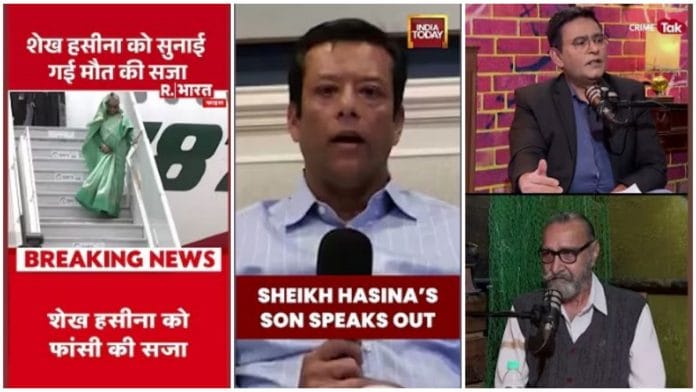Former Bangladesh prime minister Sheikh Hasina’s death sentence by a special tribunal in Dhaka burst through the domestic news bubble and became the big-picture story of Monday.
Her case was more important for television news channels in Hindi and in English than the latest on Delhi’s terror blast, the family feud in Lalu Prasad Yadav’s parivar, or even the death of at least 42 Indian pilgrims in Saudi Arabia in a bus accident.
TV news waited all Monday morning for word from Dhaka, where the International Crimes Tribunal of Bangladesh was about to deliver its verdict against Hasina and others for their roles in the violent suppression of student protests across Bangladesh in 2024.
Channels such as Republic TV and CNN News18 repeatedly went ‘live’ to the Dhaka court, where we saw serious men in serious silence sitting in neat rows before the judges. You could feel the tension in the air as they waited for the verdict.
The Hasina skew
Suddenly at lunch time, there was a flutter of ‘Breaking News’ headlines — ‘Hasina found guilty of crimes against humanity’, they announced.
“That’s the last nail in her coffin,” asserted the CNN News18 anchor.
“Death on multiple charges,” was India Today’s dramatic declaration on Hasina’s fate.
“Sazaa–e–maut,” said News Nation in true Bollywood style.
“Is this justice or political conspiracy?” asked the Aaj Tak anchor.
News channels feared, “What next for Hasina?” (Republic TV) but didn’t know the answer.
Sheikh Hasina also made an appearance. Well, not in person but in words: Times Now, Republic TV, and CNN News18 claimed that the former Bangladesh PM had made ‘exclusive’ statements to each one of them in which she said the verdict was rigged.
The standout aspect of the Hasina coverage on TV news was the speed with which it went from news to views. Most English news channels had discovered ‘experts’ to speak to: Indian academics or members of the Hasina regime. They all agreed on two things: this verdict was expected, and it was a “sham” (Times Now).
“We knew this verdict would come,” said former Hasina cabinet minister Asaduzzaman Khan to India Today.
News channels also spoke to Bangladesh journalists who had a different point of view. Some spoke of the need for “accountability” for the deaths of up to 1,400 people (CNN News18). Others, such as Shoaib Choudhary, the editor of Blitz, worried about the future in the country and in its relations with India (India Today).
The ‘Pakistan hand’ in the court verdict against Hasina soon surfaced on channels such as News Nation and CNN News18. “Pakistan ka poora haath hai,” stated the News Nation anchor with such conviction you had to believe him.
Indian experts on different channels were worried about the fallout on India-Bangladesh relations. On DD News, one Dr Joshi said there would be an impact on the stability of neighbours.
Although news channels were careful not to take sides openly, their sympathies seemed to lie with Sheikh Hasina. Most of the people they spoke to were part of her regime. Interviews with the current Muhammad Yunus government were invisible.
Monday’s prime time discussions on CNN News18, for example, had interviews with Sheikh Hasina’s son, Sajeeb Wazed, where he explained why the verdict was “ultra vires”, or exceeded the powers and legality of the court.
The following day, English language newspapers gave the Hasina case the importance it deserved as a lead story on page 1. What they also did was provide the crucial context to the Bangladesh government’s requests that Hasina be extradited from India to face “justice”.
The Times of India and The Hindu explained that the Indian government didn’t necessarily have to oblige. In ‘Death penalty for Hasina, Dhaka wants her back’ TOI said that extradition “can be refused if the offence for which it is sought is of a political character”.
The Hindu said a “big question looms over the legitimacy of Bangladesh’s International Crimes Tribunal” in an article headlined ‘On Bangladesh’s extradition request for Hasina, New Delhi has several options it can exercise’.
Also Read: The great Nithari botch-up: How the probe tied itself up in knots
A mystery deepens
Another court ruling raised more questions than answers.
We relived the ‘Nithari Horror’ (India Today) in the company of Moninder Singh Pandher, the man who had employed alleged killer Surinder Koli in his Noida home.
Last week, the Supreme Court acquitted Koli of the rape and murder of a teenage girl. This was the final of 13 cases against him for the alleged rape and murder of 19 women and children whose remains were discovered outside Pandher’s home in 2005-2006. Pandher had been acquitted of any involvement in these crimes previously.
Aaj Tak’s Shams Tahir Khan really did pull off an ‘exclusive’ on Wednesday with his interview of Moninder Pandher. It was a hard-hitting Q&A in which Pandher repeatedly denied every suggestion of guilt in crimes that were as horrific as they were brutal.
However, he didn’t offer any convincing reasons why the remains of so many victims were found outside his house.
And we are still left asking ourselves, if not Pandher and Koli, then who?
The author tweets @shailajabajpai. Views are personal.
(Edited by Asavari Singh)






